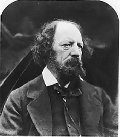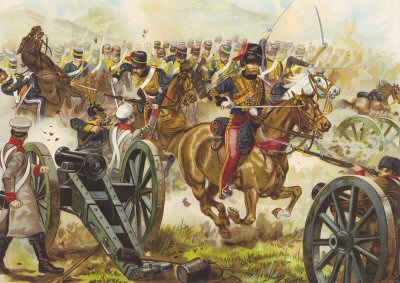The Charge of the Light Brigade
 The
Charge Of The Light Brigade
The
Charge Of The Light Brigade1809-1892
 Alfred, Lord Tennyson 1809-1892 |
This poem was
written to memorialize a suicidal charge by light cavalry over
open terrain by British forces in the Battle of Balaclava (Ukraine)
in the Crimean War (1854-56). 247
men of the 637 in the charge were killed or wounded. Britain entered the
war, which was fought by Russia against Turkey, Britain and France,
because Russia sought to control the Dardanelles. Russian control
of the Dardanelles threatened British sea routes. Many in the west best know of this war today because of Florence Nightingale, who trained and led nurses aiding the wounded during the war in a manner innovative for those times. The War was also noteworthy as an early example of the work of modern war correspondents. |
 The
Charge Of The Light Brigade
The
Charge Of The Light Brigade1809-1892
 Alfred, Lord Tennyson 1809-1892 |
This poem was
written to memorialize a suicidal charge by light cavalry over
open terrain by British forces in the Battle of Balaclava (Ukraine)
in the Crimean War (1854-56). 247
men of the 637 in the charge were killed or wounded. Britain entered the
war, which was fought by Russia against Turkey, Britain and France,
because Russia sought to control the Dardanelles. Russian control
of the Dardanelles threatened British sea routes. Many in the west best know of this war today because of Florence Nightingale, who trained and led nurses aiding the wounded during the war in a manner innovative for those times. The War was also noteworthy as an early example of the work of modern war correspondents. |
 The
Charge Of The Light Brigade
The
Charge Of The Light Brigade1809-1892
 Alfred, Lord Tennyson 1809-1892 |
This poem was
written to memorialize a suicidal charge by light cavalry over
open terrain by British forces in the Battle of Balaclava (Ukraine)
in the Crimean War (1854-56). 247
men of the 637 in the charge were killed or wounded. Britain entered the
war, which was fought by Russia against Turkey, Britain and France,
because Russia sought to control the Dardanelles. Russian control
of the Dardanelles threatened British sea routes. Many in the west best know of this war today because of Florence Nightingale, who trained and led nurses aiding the wounded during the war in a manner innovative for those times. The War was also noteworthy as an early example of the work of modern war correspondents. |
| This poem was
written to memorialize a suicidal charge by light cavalry over
open terrain by British forces in the Battle of Balaclava (Ukraine)
in the Crimean War (1854-56). 247
men of the 637 in the charge were killed or wounded. Britain entered the
war, which was fought by Russia against Turkey, Britain and France,
because Russia sought to control the Dardanelles. Russian control
of the Dardanelles threatened British sea routes. Many in the west best know of this war today because of Florence Nightingale, who trained and led nurses aiding the wounded during the war in a manner innovative for those times. The War was also noteworthy as an early example of the work of modern war correspondents. |
| This poem was
written to memorialize a suicidal charge by light cavalry over
open terrain by British forces in the Battle of Balaclava (Ukraine)
in the Crimean War (1854-56). 247
men of the 637 in the charge were killed or wounded. Britain entered the
war, which was fought by Russia against Turkey, Britain and France,
because Russia sought to control the Dardanelles. Russian control
of the Dardanelles threatened British sea routes. Many in the west best know of this war today because of Florence Nightingale, who trained and led nurses aiding the wounded during the war in a manner innovative for those times. The War was also noteworthy as an early example of the work of modern war correspondents. |
| This poem was
written to memorialize a suicidal charge by light cavalry over
open terrain by British forces in the Battle of Balaclava (Ukraine)
in the Crimean War (1854-56). 247
men of the 637 in the charge were killed or wounded. Britain entered the
war, which was fought by Russia against Turkey, Britain and France,
because Russia sought to control the Dardanelles. Russian control
of the Dardanelles threatened British sea routes. Many in the west best know of this war today because of Florence Nightingale, who trained and led nurses aiding the wounded during the war in a manner innovative for those times. The War was also noteworthy as an early example of the work of modern war correspondents. |
I
Half a league, half a league,
Half a league onward,
All in the valley of Death
Rode the six hundred.
“Forward, the Light Brigade!
Charge for the guns!” he said.
Into the valley of Death
Rode the six hundred.
II
“Forward, the Light Brigade!”
Was there a man dismayed?
Not though the soldier knew
Someone had blundered.
Theirs not to make reply,
Theirs not to reason why,
Theirs but to do and die.
Into the valley of Death
Rode the six hundred.
III
Cannon to right of them,
Cannon to left of them,
Cannon in front of them
Volleyed and thundered;
Stormed at with shot and shell,
Boldly they rode and well,
Into the jaws of Death,
Into the mouth of hell
Rode the six hundred.
IV
Flashed all their sabres bare,
Flashed as they turned in air
Sabring the gunners there,
Charging an army, while
All the world wondered.
Plunged in the battery-smoke
Right through the line they broke;
Cossack and Russian
Reeled from the sabre stroke
Shattered and sundered.
Then they rode back, but not
Not the six hundred.
V
Cannon to right of them,
Cannon to left of them,
Cannon behind them
Volleyed and thundered;
Stormed at with shot and shell,
While horse and hero fell.
They that had fought so well
Came through the jaws of Death,
Back from the mouth of hell,
All that was left of them,
Left of six hundred.
VI
When can their glory fade?
O the wild charge they made!
All the world wondered.
Honour the charge they made!
Honour the Light Brigade,
Noble six hundred!
Summary
The poem tells the story of a brigade consisting of 600 soldiers
who rode on horseback into the “valley of death” for half a league
(about one and a half miles). They were obeying a command to charge
the enemy forces that had been seizing their guns.
Not a single soldier was discouraged or distressed by
the command to charge forward, even though all the soldiers realized
that their commander had made a terrible mistake: “Someone had blundered.”
The role of the soldier is to obey and “not to make reply...not
to reason why,” so they followed orders and rode into the “valley
of death.”
The 600 soldiers
were assaulted by the shots of shells of canons in front and on
both sides of them. Still, they rode courageously forward toward
their own deaths: “Into the jaws of Death / Into the mouth of hell
/ Rode the six hundred.”
The soldiers struck the enemy gunners with their unsheathed
swords (“sabres bare”) and charged at the enemy army while the rest
of the world looked on in wonder. They rode into the artillery smoke
and broke through the enemy line, destroying their Cossack and Russian
opponents. Then they rode back from the offensive, but they had
lost many men so they were “not the six hundred” any more.
Canons behind and on both sides of the soldiers now assaulted
them with shots and shells. As the brigade rode “back from the mouth
of hell,” soldiers and horses collapsed; few remained to make the
journey back.
The world marvelled at the courage of the soldiers; indeed,
their glory is undying: the poem states these noble 600 men
remain worthy of honor and tribute today.

Thank u! May Allah reward and ease your way in whatever u do.
ReplyDelete